- Home
- Ludmila Ulitskaya
The Funeral Party
The Funeral Party Read online
The Funeral Party
Ludmila Ulitskaya
Translation copyright © 1999 by Cathy Porter
All rights reserved under International and Pan-American Copyright Conventions. Published in the United States by Schocken Books, a division of Random House, Inc., New York. Distributed by Pantheon Books, a division of Random House, Inc., New York. Originally published in Russia as Veselye Pokhorony by Vagrius, Moscow, in 1999. Copyright © 1999 by Ludmila Ulitskaya. This translation first published in Great Britain by Victor Gollancz, an imprint of Orion Books Ltd., London, in 1999.
Library of Congress Cataloging-in-Publication Data
Ulitskaia, Liudmila.
[Veselye pokhorony. English]
The funeral party / Ludmila Ulitskaya; translated from the Russian by Cathy Porter.
p. cm.
eISBN: 978-0-307-77256-5
I. Porter, Cathy. II. Title.
PG3489.2.L58 V4713 2001 891.73’5—dc21 00-059513
Schocken and colophon are registered trademarks of Random House, Inc.
www.schocken.com
v3.1
Contents
Cover
Title Page
Copyright
ONE
TWO
THREE
FOUR
FIVE
SIX
SEVEN
EIGHT
NINE
TEN
ELEVEN
TWELVE
THIRTEEN
FOURTEEN
FIFTEEN
SIXTEEN
SEVENTEEN
EIGHTEEN
NINETEEN
TWENTY
TWENTY-ONE
ONE
The heat was terrible, with one hundred per cent humidity. It was as if the whole of this great city, with its inhuman buildings, its magical parks, its different coloured people and dogs, had reached the point of a phase transition, and at any moment its semi-liquefied people would float up into the soupy atmosphere.
The shower was permanently occupied, with a queue of people standing outside. For a long time they hadn’t bothered with clothes, although Valentina wore a bra to prevent her large breasts chafing in the heat; normally she never wore one. Everyone was dripping wet, the sweat failed to evaporate from their bodies, towels didn’t dry, and hair had to be dried with a hair-dryer.
The blinds were half-open and strips of light fell across the floor. The air-conditioning hadn’t worked in years.
There were five women in the bedroom: Valentina in her red bra, Nina with her gold cross and long hair, so thin that Alik had once told her, “Nina you’re as skinny as that snake-basket.” (The basket stood in a corner of the room; when Alik was younger he had gone to India in search of ancient wisdom, but the basket was all he had brought back with him.)
Also present was their neighbour Gioia, a foolish Italian woman who had moved into the building hoping to learn some Russian in this strange environment. Gioia was forever taking offence with people, but since they never noticed her imaginary slights she always magnanimously forgave them.
Irina Pearson, formerly a circus acrobat, now a high-paid lawyer, looked stunning with her waxed bikini-line and a new bust constructed for her by an American surgeon to look no worse than her old one. With her was her fifteen-year-old daughter, Maika, known as Teeshirt (“maika” means teeshirt in Russian). A plump, clumsy girl in glasses, she was the only one of them wearing clothes. She had on a pair of wide Bermuda shorts and of course a teeshirt, depicting an electric light-bulb and a luminous message saying FUCKIT! in Russian. Alik had made it for her birthday the year before, when he still more or less had the use of his arms.
Alik himself lay on a wide divan-bed, looking as small and young as his own son. He and Nina had no children, however, and it was obviously too late for them to have any. A sort of slow paralysis was consuming the last vestiges of his musculature, and his limbs lay meek and inert, neither dead nor alive to the touch, but in some transitional state, like setting plaster. The most alive feature about him was his cheerful shock of red hair that stuck up in front of his head like a brush, and his straggly moustache which appeared enormous on his emaciated face.
This was his second week at home. He had told the doctors at the hospital that he didn’t want to die there. There were other reasons for this which they didn’t know, and which he didn’t tell them. But even in this high-speed hospital—where the doctors treated their patients like fast food cooks, with never enough time to look into their eyes, only their rear-ends, or their throats or wherever it was that was wrong—everybody loved Alik.
His apartment on the sixth floor was like a general thoroughfare, crowded from morning to night with people. Some would end up staying the night and it was an excellent place for parties, but for normal life it was hopeless, an old rehabilitated loft warehouse with the end partitioned off to make a tiny kitchen, a lavatory and shower-unit, and a narrow bedroom with a slice of window. There was also a large studio with two light sources.
In a corner of the studio was a carpet on which late guests and stray visitors would sleep. Sometimes there were as many as five of them on it. There was no front door, and people came in directly from the service lift. Before Alik moved in, bales of tobacco used to be brought up in this lift, and its smell still hovered in the air. It was almost twenty years since Alik had first arrived. He had signed the lease without really looking at it, and it had proved exceptionally advantageous to him as he still paid next to nothing for the place, although it was generally someone else who paid; it was a long time since he had had any money.
The doors of the lift clattered and Fima Gruber walked in, pulling off his pale-blue work shirt. The near-naked women paid no attention to him, and he appeared not to notice them either. He carried with him his grandfather’s old medical bag, which he had brought over from Kharkov in the Ukraine. Fima was a third-generation doctor, an educated and original man, but somehow things hadn’t worked out for him; he still hadn’t managed to pass his exams in this country, and for the past five years had had a temporary job as a kind of qualified lab assistant in an expensive private clinic. He came to see Alik every day in the hope that he might strike lucky and be able to help him.
He bent over him now: “How are you feeling, old man?”
“Oh, it’s you. Have you brought the timetable?”
“The timetable?” Fima was puzzled.
“For the ferry.” Alik smiled weakly.
It’s all over, his mind’s wandering, Fima thought, going to the kitchen and rummaging in the freezer compartment of the refrigerator for the ice-trays.
“Morons, they’re all morons. I hate them,” thought Maika. She had recently studied Greek mythology, and it was clear to her that Alik didn’t have the South Ferry in mind.
Striding to the window with an angry, haughty expression, she lifted a corner of the blind and looked down at the street, where there was always something going on.
Alik was the first grown-up in her life to earn her respect. Like many American children, since early childhood she had been dragged from psychotherapist to psychotherapist, not without reason either, since she spoke only to other children, and was reluctant to make an exception even for her mother. Other adults didn’t exist for her. The teachers at her school looked at her written work, clear, precise and laconic, shrugged their shoulders and gave her top marks. The psychotherapists thought up far-fetched theories to explain her strange behaviour; they loved unconventional children, they were their bread and butter.
Maika had met Alik at the opening of his exhibition. Irina had asked her clumsy daughter to accompany her soon after they moved to New York from California, and having suddenly lost all her friends,
Maika agreed to go. Her mother had known Alik in her youth in Moscow, when she worked in the circus, but it was many years since they had last met in America, so many years that Irina had stopped wondering what she would say to him when they met again. When they did, he put his left hand on her jacket button, with a fat, shiny eagle which resembled a hen on it, twisted it sharply and tore it off. He threw it in the air and caught it, then opened his hand and glanced at it: “I’ve got to tell you something,” he said.
His right hand hung lifelessly by his body. With his left hand he touched her thick, light-brown hair, each strand kept in place by a black silk bow edged with real pearls, and whispered in her ear: “Irka, I’m dying.”
Oh, so you’re dying, she thought; you died for me long ago. But a sharp blade twisted in the pit of her stomach, and she felt the pain running along the cut through to her spine. Maika stood nearby, watching her.
“Let’s go back to my place,” Alik said.
“I’m with my daughter. I don’t know if she’ll want to,” Irina said, looking over at her.
Her little girl generally refused to go anywhere with her; she had barely managed to persuade her to come today.
“You want to come to my artist friend’s studio?” she asked her now, convinced that she would refuse.
But Maika merely said, “The red-haired guy? Okay.”
So they went. His new paintings reminded Irina of his old ones. A few days later they happened to be passing and called in again. At some point Irina was called to an urgent meeting and left Maika in the studio with Alik for a couple of hours. She returned to find them screeching at each other like two angry birds. Alik kept bobbing up and down, flapping his left arm; the right one was wasted and almost useless.
“Why can’t you get it into your head that it’s about asymmetry! That’s all there is to it! Symmetry’s death! A dead end! A short circuit!”
“Stop yelling!” shouted Maika blushing, every freckle on her face standing out, her American accent more pronounced than ever. “Maybe I just like symmetry! What are you going to do about it anyway? Why do adults always have to be right?”
Alik dropped his arm. “Well, you know …”
Irina almost passed out by the lift. Alik, without knowing it, had effortlessly dispelled the strange autism that had afflicted her daughter since she was five. An old flame of anger flickered inside her, then died down: why take Maika to psychotherapists, when she could offer her this human contact she so obviously needed?
TWO
The lift clattered again, and in the doorway of the studio Nina saw a new visitor. Pulling on her black kimono, she flew out to meet her.
A short, immensely fat old woman seated herself breathlessly in a low armchair and planted a bulging cloth shopping-bag between her feet. She was crimson and steaming, her cheeks gleamed like a samovar.
“Maria Ignatevna, over two days I’ve been waiting for you!”
The old woman sat on the edge of the chair spreading wide her pink feet in little slipper-socks of a kind not found on this continent. “I didn’t forget you, dear, I’ve been working with Alik all this time. He was in my thoughts yesterday from six in the evening.” She held up before Nina’s face her crooked, distrophied hands with their greenish fingernails. “It’s hypertension, dear, my blood pressure’s up, I can barely walk. This wretched heat. Never mind, here’s the last of them.”
She fished out of her bag three large dark bottles containing a thick liquid. “I’ve mixed him these new oils for rubbing and inhaling. This one’s for his feet. Put some on a cloth and wrap it round his feet, then tie a plastic bag on top and leave it for a couple of hours. Never mind if bits of skin peel off, just give him a good wash the minute you take it off.”
Nina gazed raptly at this human scarecrow and her collection of remedies. Taking the smallest bottle she pressed it to her cheek to cool it, then carried them all into the bedroom, drew the blinds and set them on the narrow window-sill, where a battery of them already stood waiting.
Maria Ignatevna busied herself in the kitchen making tea; she was the only one of them who could drink it in this heat, not iced American tea, but hot Russian tea with jam and sugar.
Nina shook her long hair, whose gilt was wearing away to reveal a deeper silver underneath, and started putting compresses on Alik’s feet. Then she covered his body with a thin bedspread of some fake, clanless Scottish tartan.
Maria Ignatevna was chatting with Fima, who wanted to know about her results.
She peered at him with benign contempt. “Results? Efim Isakich! Fima! What results! They smell of the earth. It’s all in God’s hands, that’s what I say. I’ve seen it for myself—someone’s going, they’re just about to go, but no, He won’t let them. There’s power in those plants, they can go through rock. It’s the top bit you need. I only use the top bit, even with the roots. A person’s bent right down to the ground, next minute they’re standing up right as rain! You must have faith in God, Fima. Without God even the plants won’t grow!”
“I expect you’re right,” Fima said lightly, rubbing his left cheek, still pitted with the traces of hormonal battles of his youth.
In his fifth year of botany he had studied positive phototaxis, about which this woman with a face like a dishcloth uttered her vague and enigmatic pronouncements. But whatever skills he possessed as a doctor told him there was no hope for Alik and his cursed illness; his last working muscle, in his diaphragm, was already packing up. In the next few days death from asphyxiation would surely follow. The question for Americans in these cases—when to switch off the machine—had been settled ahead of time by Alik himself: he had left the hospital just before the end, and in so doing had refused the pathetic makeweight of an artificially prolonged life.
It depressed Fima to think that at some point he would probably be the one to administer to Alik the sedative which would ease the torment of asphyxiation, depressing his respiratory system as a side effect, and thereby killing him. But there was nothing to be done about it; calling for an ambulance to take him to the hospital, as they had done twice before, was out of the question now, and finding more false papers for him would be both risky and difficult.
“Good luck to you,” he said softly to Maria Ignatevna, grabbing his bag and hurrying out without saying goodbye.
Maybe he was cross about something, Maria Ignatevna thought. She had little understanding of life in this country. She had been summoned from Byelorussia a year ago by a sick relative, but by the time she had filled in the forms and was ready to leave there was no one left to cure, so she crossed the ocean with her magic powers and contraband herbs for nothing. Not for nothing, in fact, because here too she found admirers of her craft, and she practised her unlawful and unlicensed healing activities without fear of the consequences. No one could tell her anything about taxes or licences, she was amazed by the way things were done here; she treated people, she snatched them from the other world—what did she have to fear?
When Nina first met her in the small Orthodox church in Manhattan, she knew immediately that God had sent this wisewoman to her for Alik. She had turned to the Church a year or two earlier, before he fell ill, thus dealing a severe blow to superstition, and deciding that her beloved Tarot cards were a sin, she had given them to Gioia.
Maria Ignatevna was now beckoning to her from the kitchen. She hurried in, poured orange juice into a glass, topped it up with vodka and threw in a handful of ice-cubes. She always drank the American way now: weak, sweet and ceaseless. She mixed it with a swizzle stick and took a gulp. Maria Ignatevna stirred her tea and laid the spoon on the table.
“Now you listen to me,” she said sternly. “He must be baptized or nothing will work. I mean it.”
“He doesn’t want it, Maria Ignatevna, how many times do I have to tell you, he doesn’t want it!” Nina flared up.
“No need to shout,” Maria Ignatevna’s eyebrowless face furrowed. “I’m going home soon anyway. My bit of paper’s used up.” (By t
his she meant her long-expired visa, but she could never remember a single foreign word.) “The paper’s used up. In a couple of days I’m leaving, they’ve already punched my ticket. You must fetch the priest, otherwise I shall give up on him. If you do, I’ll work with him, Nina, one way or another, even from back there. If not, there’s no hope.” She flung up her arms melodramatically.
“I can’t do anything, he doesn’t want it. He just laughs. Fine, he says, let your God take me, as I am unaffiliated with any party.” Nina bowed her frail little head.
Maria Ignatevna opened her eyes wide. “What’s wrong with you, girl? What does the good Lord care about the party?”
Nina waved dismissively and gulped the rest of her drink.
Maria Ignatevna poured herself more tea. “I’m sorry for you Nina, I really am. Our Lord has many mansions. I’ve seen lots of good people, even Jews, all sorts. He has a place for all of them. Take my Konstantin, may he rest in peace. He was baptized, and now he’s waiting for me where all should be. I’m no saint, I lived with him for only two years and I was widowed at twenty-one. I got up to a few things, I admit it, I’ve sinned. But he was my only husband and now he’s waiting for me there. Do you see what I’m getting at? If you want to be with him when you get there he has to be baptized, unconscious if need be.”
“What d’you mean, unconscious?” Nina was taken aback.
“We must get away from everyone,” Maria Ignatevna hissed. And although the others were gathered around Alik at that moment and the kitchen was empty, she pushed Nina into the lavatory. Here she sat on the pink seat-cover of the toilet, while Nina perched on the plastic laundry-box and listened to her instructions in this most inappropriate of settings.
Soon Faika arrived, strong as a nutcracker, with a woody face and pale wiry hair that stuck up like pieces of straw. She was one of the most recent arrivals in America, but she had acclimatized quickly.

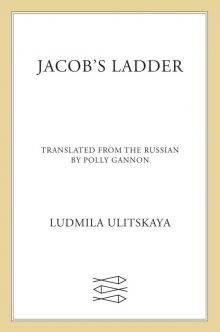 Jacob's Ladder
Jacob's Ladder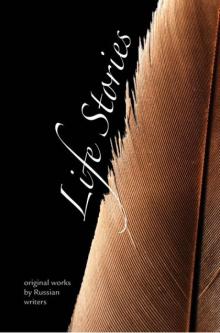 Life Stories
Life Stories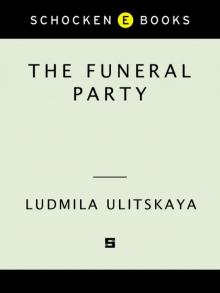 The Funeral Party
The Funeral Party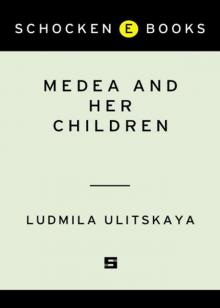 Medea and Her Children
Medea and Her Children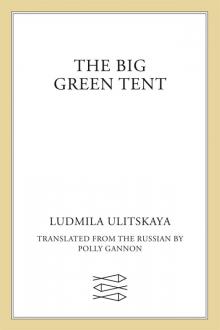 The Big Green Tent
The Big Green Tent